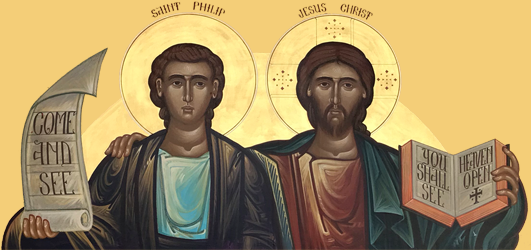Genesis 12:1-3
“Now the Lord said to Abram, ‘Get out of your country, from your kindred and from your father’s house, to a land I will show you. I will make you a great nation: I will bless you and make your name great; and you shall be a blessing. I will bless those who bless you, and curse those who curse you; and in you all the tribes of the earth will be blessed.’” (OSB)
Terah, Abram’s father, had already moved his family from Ur of the Chaldeans to Haran, a city at the northern tip of the Euphrates River, when Abram received the divine call to depart for Canaan—altogether a migration of around 1000 miles. Humanity’s “eastward” exile is, it seems, beginning to be reversed in the family of Abraham’s return. In Genesis 11:30, the narrator of Genesis has also given us an important piece of information that sets up much of the drama to come in Abraham’s life: “Now Sarai was barren, and had no child.” Can life come from this “death”? Will Sarah be released from her “exile” (cf. Isa 54:1)? Will there be a “seed of the woman” to bruise the head of the serpent (Gen 3:15)?
Genesis 12:1-3 is God’s promise to Abram, which precedes the covenant which will be made in Genesis 15, then sealed in the sign of circumcision in Genesis 17 when Abram’s name is changed to “Abraham” and Sarai to “Sarah,” and then “endangered” in the offering of Isaac in Genesis 22. This promise has three interrelated parts:
1. Descendants: “I will make you a great nation”
2. Relationship/Blessing: “I will bless you … and you shall be a blessing”
3. Land: “[Go] to a land I will show you. … To your seed I will give this land” (Gen 12:1, 7)
These three aspects chart plot-lines that will be developed across the story of the Pentateuch. The promise of descendants will be largely resolved in the book of Genesis, for as we enter the book of Exodus we find Israel’s family fulfilling the creation mandate of Gen 1:26-28: they are multiplying and filling the land/earth (Exod 1:7). The promise of relationship/blessing will be most clearly defined in Exodus and Leviticus, when God saves His people, forgives them (Exod 32-34), and gives them directions on how to worship Him, to ensure His presence among them, unto blessing and not cursing (Lev 26). The promise of land, anticipated in Abraham’s purchase of a burial plot for Sarah (Gen 23), is always in the background of the story as Israel’s ultimate destination (e.g., Exod 15:17-18), yet becomes most clearly the concern in the book of Numbers as Israel takes shape as a “military community” moving towards the land. All three lines merge in Deuteronomy which functions as the hinge between the Pentateuch and the rest of Israel’s story.
In Genesis 12, we already see Abraham’s defining quality—his πίστις, faith/faithfulness, which will soon be “reckoned unto him for righteousness” (Gen 15:6) before circumcision enters the picture as St. Paul will later emphasize (Galatians 3). Receiving the promise in Haran, Abram immediately sets out for the land of Canaan, “leaving his own country” and his “father’s house” (like the Queen Mother of Ps 44:11 [45:10]). Following St. Paul, the Fathers see in this the paradigm for our baptismal departure from our native land and death to natural kinship ties—both according to the flesh and, in spiritual terms, according to our devilish paternity (Jn 8:44) and the “family” of the vices associated with the “flesh”—unto our new life in Christ, our new homeland, the heavenly Kingdom, and our new kindred, the virtues (see ACC Genesis 12-50, pp. 1-4).
~ By Reader Justin Gohl

